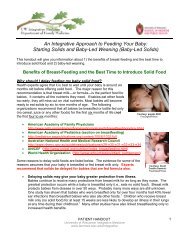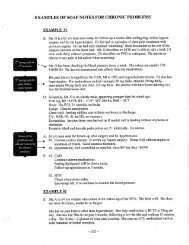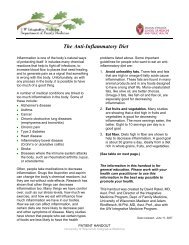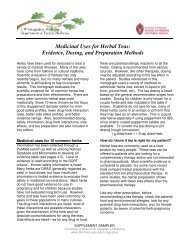Mental Notes Magazine - UW Family Medicine - University of ...
Mental Notes Magazine - UW Family Medicine - University of ...
Mental Notes Magazine - UW Family Medicine - University of ...
Create successful ePaper yourself
Turn your PDF publications into a flip-book with our unique Google optimized e-Paper software.
Willpower Depletion and Its<br />
Effects on Work Outcome<br />
Alessandro Bucciol PhD 1 , Daniel Houser PhD 2 and Marco Piovesan PhD 3<br />
1<br />
Department <strong>of</strong> Economics, <strong>University</strong> <strong>of</strong> Verona, & Netspar, Italy; 2 Interdisciplinary Center for Economic Science (ICES),<br />
George Mason <strong>University</strong>, Fairfax VA, USA; 3 Harvard Business School, Harvard <strong>University</strong>, Cambridge, MA , USA<br />
Our research is the first to<br />
study the connection between<br />
willpower, temptation and<br />
performance<br />
Every day, people resist the impulse to eat junk food, to<br />
say inappropriate things, to cheat on their partner, etc.<br />
Self-control also forces individuals to follow rules and<br />
norms prescribed by society rather than undertaking a<br />
more selfish behavior. Behaving in an appropriate way<br />
requires energy that must then be subtracted from other<br />
domains. The same concept applies to the workplace: we<br />
sometimes find it difficult to concentrate on the boring<br />
task at hand, and thus are tempted to play instead <strong>of</strong><br />
work. For instance, many businesses rely on the Internet,<br />
making Internet temptation a largely unavoidable part<br />
<strong>of</strong> today’s workplace. In particular, social networking on<br />
Facebook or MySpace, shopping on Amazon or eBay, or<br />
spending time with personal email are only a mouseclick<br />
away for many <strong>of</strong>fice employees. A widely-cited<br />
survey conducted in 2005 by America Online and Salary.<br />
com ranked personal Internet use as the number one<br />
way people waste time at work (Salary.com, 2007.)<br />
Consequently, to encourage workers’ productivity, <strong>of</strong>fices<br />
<strong>of</strong>ten adopt policies monitoring Internet use during work<br />
hours. As a result, rather than succumbing to the Internet<br />
temptation, many employees will delay their gratification<br />
by waiting until their workday ends to use the Internet.<br />
Nonetheless, the above examples suggest that selfcontrol<br />
is a deliberative, conscious and effortful action,<br />
and that using willpower to delay gratification can impact<br />
performance on subsequent tasks. Therefore, prohibiting<br />
or controlling employees’ temptation can decrease their<br />
productivity, slow down reaction times, and increase<br />
errors and lapses in vigilance.<br />
An extensive literature in psychology and economics<br />
demonstrates the importance <strong>of</strong> willpower to decisionmaking.<br />
Additionally, recent work in social psychology<br />
suggests that using willpower to resist temptations can<br />
negatively impact performance on subsequent tasks<br />
(Vohs and Heatherton, 2000). One explanation is that<br />
willpower creates costly self-control problems, thereby<br />
consuming an individual’s energy. As energy is a limited<br />
resource, individuals putting energy into willpower will<br />
have little energy left. They therefore tend to become<br />
more passive in making decisions and completing tasks<br />
(see Muraven et al., 1998). Our research is the first to<br />
study the connection between willpower, temptation<br />
and performance. In particular our goal is to investigate<br />
Behaving in an appropriate way requires energy that<br />
must then be subtracted from other domains<br />
whether exposure to a prohibited tempting item<br />
reduces work productivity on a subsequent task.<br />
In a first study (Bucciol et al., 2011a), we ran a field<br />
experiment on a sample <strong>of</strong> children. We focused on<br />
children (aged between 6 and 13) in order to take<br />
advantage <strong>of</strong> the well-established fact that the selfregulatory<br />
resources <strong>of</strong> younger children are more<br />
easily depleted than those <strong>of</strong> older children. In the<br />
experiment, the temptation was a table <strong>of</strong> snacks and<br />
drinks. We found that exposure to temptation only had<br />
a significantly detrimental impact on the productivity<br />
<strong>of</strong> younger children. This conclusion is compatible with<br />
the view that productivity falls when it is costly to exert<br />
self-control. We then wanted to see if this finding would<br />
hold true in a stylized environment more closely related<br />
Summer 2012 / <strong>Mental</strong> <strong>Notes</strong> / 29

















